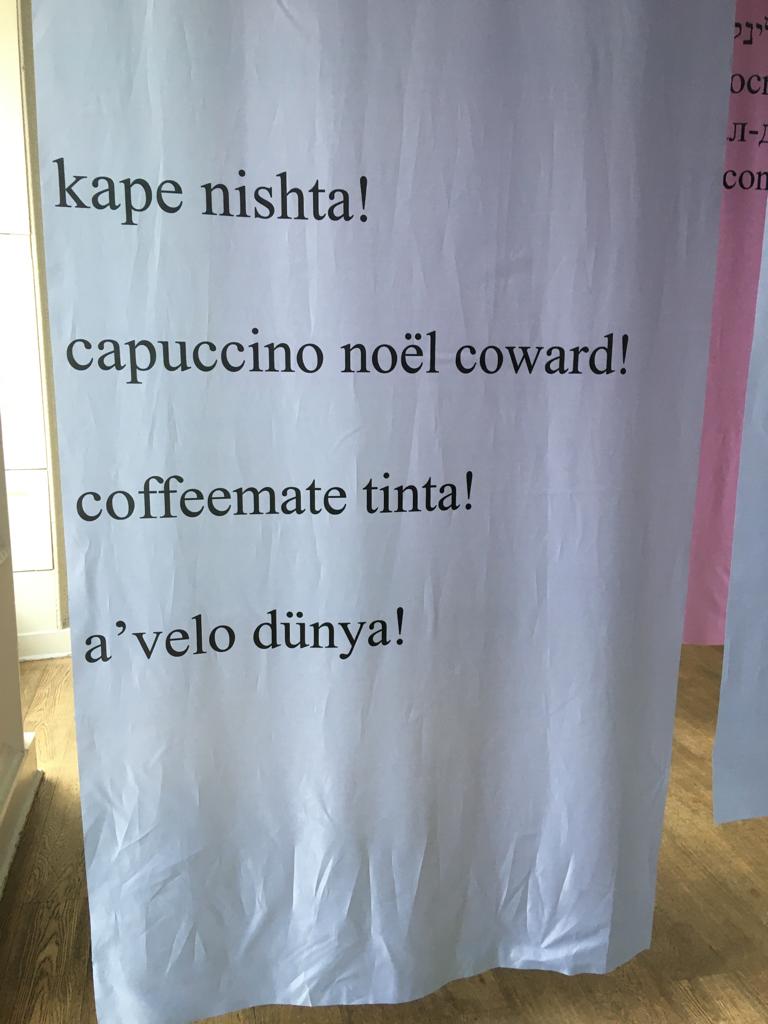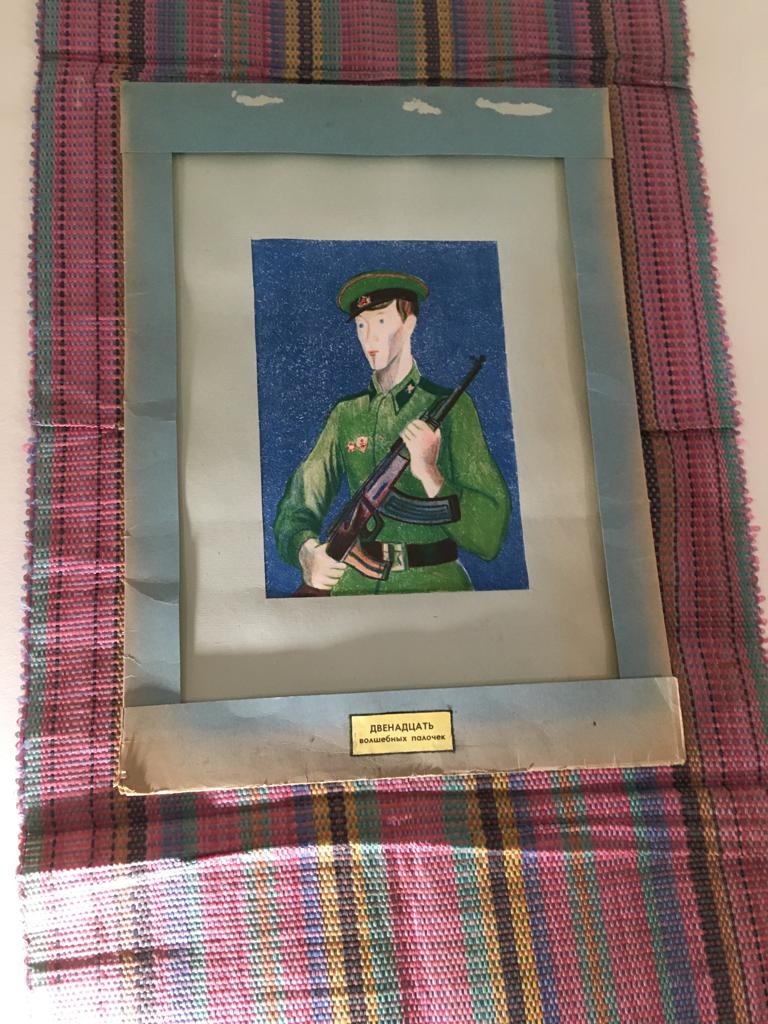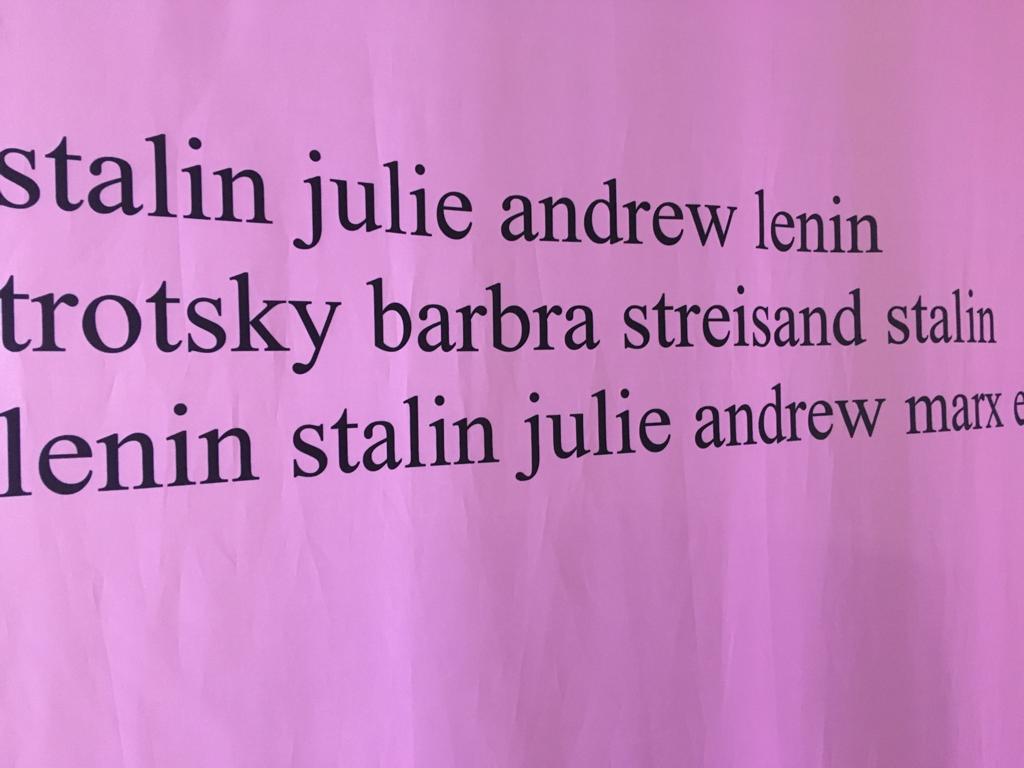This is a two artist exhibition in Pushkin House, the Russian cultural centre in London, which has no connection with the Russian government or state but has for many years acted as a base for Russian music, literature, art and talks about travel and culture in Britain. With the vicious repression of all aspects of LGBTQ life and culture in Russia, I thought that it sounded like a very unusual exhibition to visit and was not disappointed.
The two artists are Yevginy Fiks and Ian Ginsburg. Two very different projects are brought together, juxtaposed across the themes of conceptual recontextualization and authoritative appropriation of language – both in a linguistic and visual sense.

Ginsburg re-examines and reimagines the work of the Soviet queer artist Viktor Duvidov (1932-2000). Famous as a children’s book illustrator Duvidov, was convicted for homosexuality and during the Soviet period and later created a series of erotically challenged etchings and woodcuts based on his prison experiences.
Ginsburg’s image “Ideal lover” incorporates Duvidov’s Portrait of a Young Man, with Ginsburg surrounding the portrait with a shirt covered in contemporary LGBTQ images including a rainbow flag. Here Ginsburg reflect on queer images of beauty and aesthetics.
Many of the collages are framed in wooden drawers which draws attention to the closeted and secretive nature of hidden queer lives in both the Soviet Union (where Duvidov suffered) and Putin’s Russia.
Another work of Duvidov which Ginsburg has utilised is titled “Border Guard”, a collage with the original portrait surrounded by linocut and fabric. The fresh faced very Slavic looking border guard appeals to the queer sensitivity while also stressing the ways that queer life in Russia are literally bordered by punishment and constraints. Another striking prison portrait by Duvidov has a collage suggesting that little has changed for LGBTQ people in Russia between the Soviet prison scenes and contemporary Russia.

Ginsburg explains: “After I became interested in Duvidov, I decided to rebuild the narrative of his creative life using clippings and cropping of his work. I follow the method of Ilya Kabakov who would invent characters in his work, but while Kabakov treats them formally, my narrative, on the other hand, is based on the biography of a real person”
Upstairs at the exhibition is the work of Fiks. He suggests the possibility of a global non-hierarchical emancipatory language using words and phrases related to queer identities in many languages, including insiders slang – almost a global form of Polari.
Visitors can peruse this dictionary which includes terms such as “gilete” (appearing to be bisexual in a pejorative sense) “teta” (an aunt, used by gay men to describe effeminate gay men) and “romanick” (a young man without needs). There are a wide variety of cultures and languages represented although it has to be said that most refer to gay men and there are far fewer terms referring to queer women, although there are some non binary references. The ability of languages to drill down into every aspect of queer subcultures is impressive.
The room is festooned with large hanging banners bearing many of these terms in bright colours. One of my favourites was “Stalin. Julie. Andrew. Lenin. Trotsky. Barbara Streisand. Stalin. Lenin. Julie Andrew. Marx” I cannot imagine that being carried on many May Day parades!

Overall this is a very impressive but also humorous and enlightening exhibition about the lives of queer people both in Russia past and present and globally. It now runs until 26 February as part of LGBT+History Month.
Art Book Review Books Campism Capitalism China Climate Emergency Conservative Government Conservative Party COVID-19 Creeping Fascism Economics EcoSocialism Elections Europe Far-Right Fascism Film Film Review Fourth International France Gaza History Imperialism Iran Israel Italy Keir Starmer Labour Party Long Read Marxism Marxist Theory Migrants Palestine pandemic Protest Review Russia Solidarity Statement Trade Unionism Ukraine United States of America War Women

